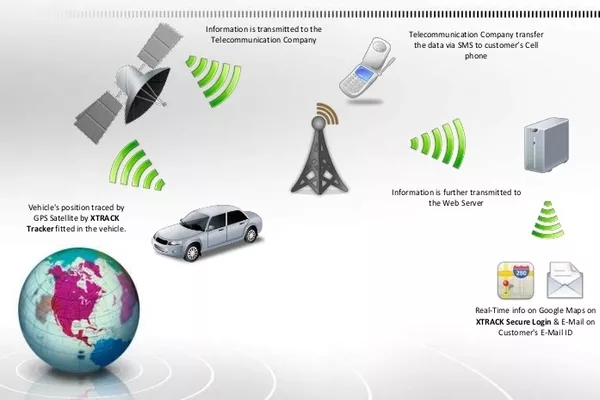The ever-evolving world of technology and innovation has introduced us to new modernized applications that are designed to make life better, easier and more convenient.
One of these innovations is GPS Vehicle Tracking Technology and the conveniences that it offers. But what exactly is GPS and how much help does it really offer? Read on this article from Philkotse.com to find out.
1. What is GPS Tracking Technology?
GPS is an acronym for Global Positioning System. This refers to the portable devices that act as trackers that allow people to monitor and keep track of vehicles. The GPS can collect data as well as pictures of the current location of the vehicle.
Aside from location information, GPS can also be programmed to gather and send real-time data that concerns the vehicle’s status. Examples of information that GPS can collect are ignition status (on/off), vehicle speed and if the vehicle doors are open or closed.
![]()
GPS is an acronym for Global Positioning System
2. Classifications of GPS
GPS devices are generally divided into two classifications. These are the “passive” and the “active” tracking devices.
Passive tracking devices
The passive tracking devices can store GPS location along with other info like speed. Trigger actions can also prompt the GPS to capture information. Examples of trigger actions include turning the key to “on/off” position or when the vehicle enters a specific location.
All this information will be stored in the provided data space that came with the GPS assembly. Once the vehicle reaches point B of his journey, the stored information will be taken out by the personnel who are assigned to do the job.
![]()
The passive tracking devices can store GPS location along with other info like speed.
Active tracking devices
Active tracking devices, on the other hand, are also capable of collecting the same information. Unlike passive devices where you need a copy of the stored memory in the vehicle, active tracking devices send the data near-real time.
This utilizes satellite networks and signals to transmit the data to the host software via the GSM network. The data collected will then be viewable to the receiving devices and should be ready for evaluation.
![]()
Active tracking device utilizes satellite networks and signals to transmit the data to the host software via GSM network
Due to the fast-paced requirements of everyday living, a lot of vehicles (especially those in the courier business) are installed with both Active and Passive tracking devices. This lets the software monitor the vehicle near real-time where cellular and satellite signals are available.
If the vehicle ventures in an area without signal, the passive tracker will be prompted and will start to gather data and save it for later. When the vehicle re-enters an area with satellite coverage, the passive tracker will disable (or not, depending on the program) and let the active tracker take over again.
3. How GPS Tracking Works
If you’ve actually used a GPS, you’d know that this works like making a call or sending a text message. It doesn’t matter which device or vehicle you will initiate the GPS. It utilizes the same technology that your cellular phone does to connect to the internet, hence the need to pay for GPS subscription fees for your car.
GPS tracking uses satellites to locate your device using a process referred to as trilateration. This technology is also used by in-car navigation systems, but with a few differences. For instance, a navigation system lets you know your location and informs you of the direction towards where you want to go.
A GPS tracker records the places where you’ve been (along with other data as gathered from your vehicle) and transmits the information in real-time or saves it for later use.

GPS tracking uses satellites to locate your device using a process referred to as trilateration
>>> Read more: This is what happens when you put absolute belief in GPS directions
4. Benefits of GPS Vehicle Tracking Technology
Cuts down operating expenses
You’ll find a GPS tracking system as a worthy investment if you’re managing a business that runs on transportation services. A quality fleet management system will let you pick the shortest routes every time you need to make a trip.
The shorter the distance traveled, the less money you will need for fuel. Since there’s a shorter time to reach the destination, you would also cut down on overtime pay for your employees.
Saves you time
Indeed, time is gold for a lot of us. However, nobody knows this statement better than those entrepreneurs in the fleet and transportation business. You lose money just by getting stuck in traffic; and if you continue to go through this experience for the rest of your operations, you are bound to go bankrupt any time in the future.
With the help of GPS tracking systems, you will be able to know the areas wherein your previous fleets have had longest traffic time. As a resolution, you can plan new routes to save time, money, and gas for the succeeding operations.
You will be able to know the areas wherein your previous fleets have had longest traffic time
Optimize resource consumption
An intelligent GPS tracking system will allow you to monitor your vehicle speed, fuel efficiency as well as the driver’s behavior and idle time. With the information collected by the GPS, you can formulate solutions to use your resources more efficiently to save money.
Minimize vehicle idle time
GPS can help you maximize the utilization of your vehicles. This basically means more operations, more profit generated. By analyzing the data generated by your tracker, you can address problems that the in-house management are usually not informed about.
Issues like over-speeding, increased driver idle time and high fuel consumption can cost you a big amount of money.
![]()
Stop Idling = Start Saving
>>> Related post: 6 ways to reduce your driving emissions
Becoming more predictable to clients
The clients pay for the service of your business. With the use of GPS, you will be able to provide them near accurate info about the arrival of their shipment. You will also be giving them real-time tracking info which will build trust and invite more clients.
Keep clients satisfied
The GPS installed on your fleet under operation will let you know of its whereabouts and how far they are from where they need to be. With that information, you can confidently answer queries when clients start to dial your customer support line.
![]()
Thanks to GPS tracker, you can know where your car is
Locate your vehicles
We never wish it but sometimes your fleet and vehicles may not reach their destination due to accidents or the act of criminal minds. Having GPS installed on your vehicle will let you know about the status of the vehicle before the accident happened. If your vehicle got stolen, you will also be informed of its whereabouts.
Recent posts
- 7 must-have active safety features in modern car Apr 13, 2021
- 5 must-know tips to make better use of navigation car apps Nov 30, 2022
- What fancy high-tech car features should be prioritized? Nov 24, 2018
- 4 most useful navigation apps available in the Philippines Aug 25, 2021
- 12 safety features of modern cars you should understand Jul 26, 2018












